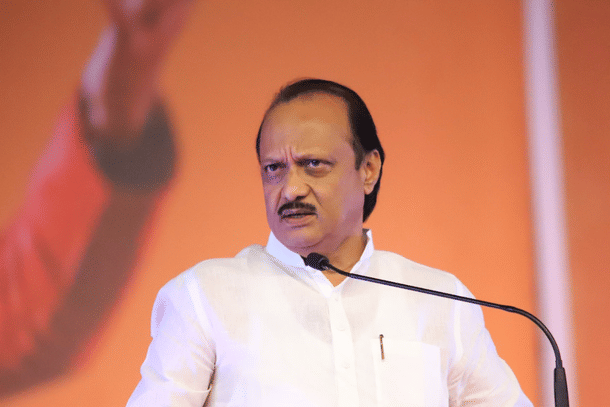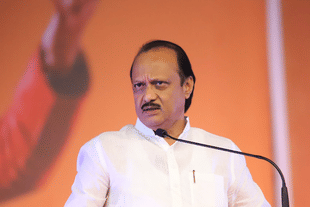Maharashtra
Age Is Not Just A Number: Ajit Pawar Is Asking The Right Questions Of His Uncle
R Jagannathan
Jul 06, 2023, 11:30 AM | Updated 11:23 AM IST
Save & read from anywhere!
Bookmark stories for easy access on any device or the Swarajya app.


Despite the use of politically-incorrect language, it is difficult not to empathise with Ajit Pawar, the man who led the revolt against his octogenarian uncle Sharad Pawar’s unending supremacy in the Nationalist Congress Party (NCP).
The junior Pawar is quoted in The Times of India as saying: “You’re now 83. Aren’t you going to stop?”
He pointed out that government jobs come with a retirement date, and even the Bharatiya Janata Party (BJP) asks leaders above the age of 75 to retire.
The New Indian Express attributes a slightly different quote to Ajit Pawar, but the end-meaning is the same. The nephew thinks it is time for his uncle to hang up his boots and bless his successor.
When to retire is a question not just for Sharad Pawar, but all people leading large organisations, whether political, business or social.
His daughter Supriya Sule gave the wrong answer. She used the usual cliche — that age is just a number — to respond to Ajit Pawar’s question, and gave the wrong examples of Ratan Tata and Amitabh Bachchan to justify Sharad Pawar’s unwillingness to relinquish power.
She said, to quote from The Times of India again: “Age is just a number. There is absolutely no match for Sharad Pawar, who has just crossed 83.”
Age may be just a number for people close to or just above the retirement age, but for most people age comes with a slowdown in mental and physical abilities, and it gets worse as you enter the late seventies or eighties.
For Sule’s information, Ratan Tata did retire at 75, though he made a short comeback when he thought Cyrus Mistry was not doing what was expected of him as head of Tata Sons.
You can disagree with Tata on this, but a short-term intervention is not the same as remaining at the helm permanently.
N R Narayana Murthy returned to Infosys when large investors felt things were not going well for the company. But he left once a good successor was found in Salil Parekh.
Starbucks CEO Howard Schultz also returned as CEO when the company needed his help. Despite three stints as CEO, he said last year that he would not return. And he was “just” 69 when he finally retired.
As for Amitabh Bachchan, he works solo, and does not lead a large organisation. He is using his own brand equity and extraordinary acting skills to do what his advertisers and film directors want. He does not need a successor.
Ajit Pawar also pointed out how his uncle was using hypocritical arguments to stay in power. Right now it is about not aligning the BJP, when the elder Pawar has often shown a willingness to do just that.
He broke with his original party (Congress) at least twice to grab power, and has often spoken against not aligning with the Shiv Sena. Now he thinks the BJP should be the untouchable, and gives ridiculous arguments to oppose Ajit’s decision to align with the BJP in Maharashtra.
The Economic Times quotes him as saying: “We are being accused of going with the Shiv Sena and that there is no difference between BJP and Shiv Sena. Sena’s Hindutva is all-encompassing, it takes everyone along, while BJP’s is poisonous. They are Manuwadi and are a threat to the nation.”
So a party run by one family, the Thackerays, and which used to dig up cricket pitches before any India-Pakistan cricket match, is “all-encompassing”, and cadre-based party, which has no such job reservations for family scions, is Manuvadi.
Clearly, Pawar wants to make this battle with his nephew a caste-based fight.
And this is coming from a man who was more than willing to receive a Padma Vibhushan from the same BJP government in 2017.
One can understand why those who have enjoyed untrammelled power are reluctant to name successors. The minute this happens, people start moving their allegiance to the latter. Thus, even when the older icon is still in saddle, he experiences a steady loss of real power.
An unwillingness to let go when succession can be smooth is what derails large organisations. Dhirubhai Ambani failed to anoint a successor, and his two sons had to fight to establish supremacy.
Many new-age gurus also fall into the same trap. They love their iconic status too much to formally anoint a successor when they are still around.
Not for nothing does Hindu tradition prescribe vanaprastha and sanyasa for those who have earned wealth and power during their grihastha stage.
Our politicians try to avoid even the intermediate vanaprastha stage, where you start withdrawing from positions of power, leave alone accept full sanyasa.
The result is obvious: when you don’t leave with dignity, you will be forced out ignominiously. N T Rama Rao had to be ousted by his son-in-law N Chandrababu Naidu. Others were ousted by rivals outside the party.
Sharad Pawar should have seen the writing on the wall much earlier. Now his nephew is reading it for him.
Whether Ajit Pawar is corrupt or not is a separate question, but he is certainly entitled to ask his uncle: when will you go?
Jagannathan is former Editorial Director, Swarajya. He tweets at @TheJaggi.





